Mental health commission report July 2010 - June 2011 [.pdf]
Mental health commission report July 2010 - June 2011 [.pdf]
Mental health commission report July 2010 - June 2011 [.pdf]
Create successful ePaper yourself
Turn your PDF publications into a flip-book with our unique Google optimized e-Paper software.
Aussie OptimismDissemination Report<strong>July</strong> 2009 – <strong>June</strong> <strong>2010</strong>Margaret Ho & Clare RobertsFaculty of Health Sciences, Curtin University
Executive SummaryThe Aussie Optimism Dissemination Project is a collaborative research project between the <strong>Mental</strong>Health Commission (MHC), Department of Education (DOE) and Curtin University’s School ofPsychology & Speech Pathology. This project involves the ongoing implementation and training of aschool‐based mental <strong>health</strong> promotion program which has shown efficacy in reducing internalisingproblems and preventing the up take of alcohol and drugs of in young adolescents, as well aspromoting social and emotional well‐being.Several project outcomes have been identified as contributing to both the integrity andsustainability of the Aussie Optimism Program; in particular the:1. Train‐the‐Trainer workshops – Two workshops were conducted in the first half of <strong>2010</strong>, witha total of fourteen participants. These workshops help to ensure sustainability of theprogram in Western Australia and quality control for the school community. They promoteaccess to trainers who can conduct the teacher‐training workshops and provide coachingand support as needed;2. Teacher‐training workshops – Twenty four workshops were run in the 2009‐<strong>2010</strong> financialyear with 283 DOE and non‐government school staff (teachers, school psychologists etc.)trained in Aussie Optimism. These workshops serve as the front‐line of the program as theyprovide the training for teachers to learn how to use the program and resources and;3. Evaluation of student mental <strong>health</strong> – gives an indication of the impact of the program hason student’s experience of anxiety and depression, and drug and alcohol problems.The Aussie Optimism research team also continues to actively promote and share research findingswith local professional groups and at national and international conferences and meetings.2 | P age
ContentsExecutive Summary ................................................................................................................................. 21 PROJECT DESCRIPTION .................................................................................................................... 42 PROGRESS REPORT ......................................................................................................................... 42.1 OUTPUT 1: TRAIN‐THE‐TRAINER ............................................................................................. 4Train‐the‐Trainer Resources ........................................................................................................... 4Train‐the‐Trainer Workshops .......................................................................................................... 5Evaluation of the Train‐the‐Trainer Workshops ............................................................................. 5Train‐the‐Trainer Support ............................................................................................................... 92.2 OUTPUT 2 TEACHER TRAINING: JULY 2009 – JUNE <strong>2010</strong> ....................................................... 9Implementation Workshops ........................................................................................................... 9Evaluation of Department of Education (DOE) Implementation Workshops ............................... 10Evaluation of Non‐Government Psychological Service (NGPS) Implementation Workshops ...... 13Additional Workshops ................................................................................................................... 152.3 OUTPUT 3: SECONDARY DISSEMINATION EVALUATION OUTCOMES.................................. 16Secondary Dissemination Outcomes ............................................................................................ 16Schools & Aussie Optimism .......................................................................................................... 16Dissemination Project – Research Results .................................................................................... 173 CONFERENCE PAPERS, PUBLICATIONS & PROJECT UPDATES ....................................................... 183.1 PRESENTATIONS .................................................................................................................... 183.2 PUBLICATIONS ....................................................................................................................... 183.3 PROJECT UPDATES ................................................................................................................ 19Australian Research Council – Linkage Grant ............................................................................... 19Aussie Optimism – Going Overseas .............................................................................................. 194 FINANCIAL REPORT ....................................................................................................................... 205 ACTIVITY REPORTS ........................................................................................................................ 215.1 <strong>Mental</strong> Illness Prevention: Aussie Optimism; Train‐the‐Trainer .......................................... 215.2 <strong>Mental</strong> Illness Prevention: Aussie Optimism; Teacher Training ........................................... 225.3 <strong>Mental</strong> Illness Prevention: Aussie Optimism; Evaluation of Student Health ........................ 236 Appendices .................................................................................................................................... 243 | P age
Project Title:Diffusion & Dissemination of a <strong>Mental</strong> Health Promotion Innovationin an Educational Setting1 PROJECT DESCRIPTIONThe Aussie Optimism Program is an evidence‐based intervention program for upper primary schoolchildren that enhances mental <strong>health</strong> and reduces depression and anxiety.The project aims to:‣ Extend the Aussie Optimism Dissemination Project to further secondary disseminationefforts in both metropolitan and rural Department of Education districts in WesternAustralia;‣ Extend the dissemination of this program to non‐government schools and;‣ Conduct a 3‐year follow‐up of students who participated in the original dissemination trial in2003.In line with these aims, the project for the 2009‐<strong>2010</strong> year has three components to <strong>report</strong> on:‣ Train the trainer workshops: The training of Department of Education staff and/or stafffrom the Non‐government School Psychology Service to train and support teachers in theimplementation of the program;‣ Teacher training: The training of teachers in program implementation; and‣ Evaluation of student mental <strong>health</strong> outcomes2 PROGRESS REPORT2.1 OUTPUT 1: TRAIN‐THE‐TRAINERTrain‐the‐Trainer ResourcesThe Aussie Optimism: Positive Thinking Skills (PTS) Trainer’s Manual is now complete and has beendisseminated to all new trainers that attended the Train‐the‐Trainer workshop in March <strong>2010</strong> andseveral existing trainers that attended a specific PTS Train‐the‐Trainer workshop in May <strong>2010</strong>. Thereis now a complete kit available for the PTS trainers which is comprised of:‣ Trainer’s Manual;‣ CD‐ROM (for training with presentation slides);‣ Teacher Resource;‣ Workshop Information Booklet;‣ Student Workbook; and‣ Parent WorkbookTeachers who attend the workshops receive the following kit which is priced at $60.00:‣ Teacher Resource;‣ Workshop Information Booklet;‣ Student Workbook; and‣ Parent Workbook4 | P age
Train‐the‐Trainer WorkshopsTwo Train‐the‐Trainer workshops were conducted in the first half of <strong>2010</strong>. The first workshop tookplace in March <strong>2010</strong> and was attended by 8 school psychologists and 1 Health and PhysicalEducation teacher who is also a Student Well‐Being and Transition (SWAT) Coordinator from theDepartment of Education (DOE; see table 1). It is important to note that 2 of the new trainers(Renee Dobra and Robyn Green) are from the Pilbara Education District, which previously did nothave any Aussie Optimism Trainers. Aussie Optimism now has trainers in 12 out of the 14 districts inWestern Australia.Table 1: Train‐the‐Trainer attendees March <strong>2010</strong>Trainer Position Districts/affiliationsSally ArmstrongCheryl ChapmanJane LindesayErin PrattRenee DobraRobyn GreenLisa PesickDebbie HarrisonBruce CoulterSchool PsychologistSchool PsychologistSchool PsychologistSchool PsychologistSchool PsychologistSchool PsychologistSchool PsychologistSWAT Coordinator/ H&PETeacherSchool PsychologistKimberley DistrictSwan DistrictMid West DistrictMid West DistrictPilbara DistrictPilbara DistrictFremantle‐Peel DistrictFremantle‐Peel DistrictWarren‐Blackwood DistrictThe second Train‐the‐Trainer workshop took place in May <strong>2010</strong> and was specifically designed forexisting trainers to become accredited for PTS. Five trainers attended this workshop – see table 2 forlist of attendees.All trainers have been supplied with a training kit and the resources and manuals to provide trainingto the teachers in their districts. All trainers (in Western Australia) will be paired with a universitybasedtrainer to conduct their first workshop and receive ongoing support via phone and e‐mail.Evaluation of the Train‐the‐Trainer WorkshopsThe March <strong>2010</strong> Train‐the‐Trainer workshop was evaluated in terms of meeting the needs of thenew trainers for information, skills, and knowledge. The participants’ satisfaction and overall ratingwas 4.50 (on 5‐point scale), indicating a “good” to “very good” level of satisfaction (see table 3 formore information).5 | P age
Table 2: Train‐the‐Trainer attendees May <strong>2010</strong>Trainer Position Districts/affiliationsJon AttwellPhilippa MolloyLinda NicholsonCheryl ChiaJacque ConteSchool PsychologistSchool PsychologistSchool PsychologistDirector/ PaediatricPhysiotherapistSchool PsychologistMidlands DistrictCanning DistrictCanning DistrictBrain RevolutionMid West DistrictTable 3: Means (standard deviations) for each workshop feedback questionFeedback Item Mean (SD)Relevance to Practice 4.33 (.50)Enhancement of Knowledge 4.78 (.44)Enhancement of Skills 4.44 (.53)Appropriateness of Content Level 4.78 (.44)Integration of Content 4.44 (.73)Appropriateness of Depth of Coverage 4.56 (.53)Presentation Clarity 4.33 (.71)Presentation Stimulation 4.11 (.60)Value of Handouts 4.78 (.44)Overall Rating 4.50 (.50)Note. 5‐point response choice scale where 1 = very irrelevant, no contribution, not appropriate, very poorly integrated and 5 = very highlyrelevant, very high contribution, very highly integrated, very highly appropriate. N = 9.Trainers also rated; how confident they felt to conduct Aussie Optimism implementation workshopsfor teachers, their knowledge, and their attitudes to mental <strong>health</strong> promotion, before and after theTrain‐the‐trainer workshop. These results, shown in Table 4, indicate a significant increase betweenpre‐ and post‐workshop self‐efficacy scores (t (8) = ‐4.648, p < .05), indicating that participants’confidence and self‐efficacy for implementing the Aussie Optimism program had increased after6 | P age
completing the Train the Trainer workshops. A significant difference was also found between preandpost‐ workshop knowledge scores (t (8) = ‐3.618, p < .05), indicating that the participants’knowledge about mental <strong>health</strong> and the Aussie Optimism programs had increased after completingthe Train the Trainer workshops. However, no significant difference was found between pre‐ andpost‐workshop attitude total for mental <strong>health</strong> promotion (t (8) = ‐.529, p > .05). This might suggestthat participants already had positive attitudes towards mental <strong>health</strong> promotion prior to thebeginning of the workshops.Table 4: Mean score changes in participant self‐efficacy, knowledge and attitudes followingworkshop attendance.Pre‐workshopPost‐workshopn Mean (SD) n Mean (SD)Self‐Efficacy*9 16.61 (2.71) 9 19.61 (2.42)Knowledge* 9 8.33 (2.06) 9 10.33 (1.66)Attitude Total for <strong>Mental</strong>Health Promotion9 28.33 (4.33) 9 29.11 (3.62)Note. Self‐efficacy scale range 5‐25; Knowledge scale range ‐23‐17; Attitude scale range 13‐52.*Indicates significant differenceThree participants provided qualitative feedback. These statements can be seen below:“I really enjoyed the workshop. I can see AOP being implemented in our school. My only concernwas there seemed to be too much put into one week. It seemed rushed and was then harder toconsolidate.”“Loved the program‐ fantastic resources. Can see the benefits for teachers in implementing AOPfor students. Very passionate about mental <strong>health</strong> so I feel this program will be ‘easy’ for me topromote.”“Great workshop and highly relevant and valuable info that would have been better received ifthere was better clarity around the structure and flow of the workshop. I was a little confused attimes as to where we were at and where things fitted, as things sometimes went back and forth.”This was the first time that PTS was incorporated with the other two programs (Social Life Skills andOptimistic Thinking Skills). Whilst satisfaction levels were high and confidence and knowledgeimproved significantly – the qualitative comments suggest that it was too much information for 1week. As such, future Train‐the‐trainer workshops will not include PTS. Instead the PTS Train‐the‐7 | P age
Trainer workshop will be run separately or perhaps in conjunction with Feelings and Friends(program for grade 1 – 3 students).The May <strong>2010</strong> PTS Train‐the‐Trainer workshop was evaluated in terms of meeting the needs of theexisting trainers with respect to PTS – specific knowledge, skills and confidence. The mean overallrating of the workshop was 4.20 (5‐point scale), indicating a “good” to “very good” level ofsatisfaction. All participants rated the workshop as either “good” or “very good” (see table 5 formore information).Table 5: Means (standard deviations) for each workshop feedback questionFeedback Item Mean (SD)Relevance to Practice 4.80 (.45)Enhancement of Knowledge 4.40 (.55)Enhancement of Skills 4.20 (.45)Appropriateness of Content Level 4.40 (.55)Integration of Content 3.80 (.45)Appropriateness of Depth of Coverage 4.00 (.71)Presentation Clarity 4.00 (.00)Presentation Stimulation 3.60 (.55)Value of Handouts 4.60 (.55)Overall Rating 4.20 (.45)Note. 5‐point response choice scale where 1 = very irrelevant, no contribution, not appropriate, very poorly integrated and 5 = very highlyrelevant, very high contribution, very highly integrated, very highly appropriate.Paired t‐tests were conducted to determine if significant changes occurred in knowledge and selfefficacy(see table 6 for more information). No significant difference was found between pre‐ andpost‐workshop self‐efficacy scores (t (4) = ‐2.331, p > .05), indicating that the participants’confidence and self‐efficacy for implementing the Positive Thinking Skills program did notsignificantly increase after completing the workshop. This result could be due low power and thefact that self efficacy scores were already high prior to the workshop. Also, no significant differencewas found between pre‐ and post‐workshop Positive Thinking Skills knowledge (t (4) = ‐2.557, p >.05). However, a significant difference was found between pre‐ and post‐ workshop generalknowledge (t (4) = ‐3.207, p < .05).Three participants provided qualitative feedback that can be seen below:“Very enjoyable, thank you Shari and Rosie.”8 | P age
“Well organised and run, good flexibility.”“Very good and useful information‐ thank you!”Table 6: Mean score changes in participant self‐efficacy, knowledge and attitudes followingworkshop attendance.Pre‐workshopPost‐workshopn Mean (SD) n Mean (SD)Self‐Efficacy 5 15.00 (2.55) 5 20.00 (4.00)Positive Thinking SkillsKnowledge 5 8.40 (2.51) 5 11.60 (2.97)General Knowledge*5 10.40 (1.82) 5 12.80 (1.10)Note. Self‐efficacy scale range 5‐25; Positive Thinking Skills knowledge scale range 0‐31; General knowledge scale range 0‐7.*Indicates significant differenceTrain‐the‐Trainer SupportSupport has been ongoing to the continuing trainers, via phone contact, e‐mail, meetings and cofacilitationof workshops. The new trainers from Mid West, Fremantle Peel and Swan have all beensupported by a Trainer from the AOP research team during their first workshop.All trainers were invited to attend a meeting in February; however, the meeting was cancelled asonly a few of the trainers were available. As such a newsletter was circulated to all trainers to keepthem informed of recent research outcomes (see Appendix A for the newsletter).2.2 OUTPUT 2 TEACHER TRAINING: JULY 2009 – JUNE <strong>2010</strong>Implementation WorkshopsTwenty workshops were run by Department of Education trainers in the 2009‐<strong>2010</strong> financial year. Atotal of 245 teachers, school staff and psychologists were trained in Western Australia. Fourworkshops were run by the Non‐government schools psychological service, with 38 participants.Table 7 shows the distribution of workshops across Education Districts/Services in Western Australia.9 | P age
Table 7: Number of participants trained in Positive Thinking Skills, Social Life Skills and OptimisticThinking Skills for each district.DistrictPositive ThinkingSocial LifeOptimistic ThinkingSkills (N)Skills (N)Skills (N)Fremantle – PeelWarren‐BlackwoodCanningNarroginMidlandsWest CoastSwanMid West 14Non‐Government412 91610 101417 207342 2816 22Evaluation of Department of Education (DOE) Implementation WorkshopsAll implementation workshops were evaluated in terms of participant satisfaction, changes inknowledge and self‐efficacy to teach the different Aussie Optimism Programs. Table 8 shows meansand standard deviations for all Social Life Skills and Optimistic Thinking Skills DOE pre‐and postworkshopscores.Please note that these results do not incorporate the Narrogin workshop held in <strong>June</strong> <strong>2010</strong> as thedata has not yet become available.10 | P age
Table 8: Mean score changes in participant self‐efficacy, knowledge and attitudes followingworkshop attendance for Social Life Skills and Optimistic Thinking Skills Programs.Pre‐workshopPost‐workshopn Mean (SD) n Mean (SD)Self‐Efficacy*194 12.66 (3.75) 193 17.67 (3.12)Social Life Skills Knowledge* 166 5.89 (1.72) 161 7.65 (2.24)Optimistic Thinking SkillsKnowledge*68 4.51 (1.66) 67 9.91 (3.04)General Knowledge* 194 7.49 (2.25) 189 8.38 (2.19)Note. Self‐efficacy scale range 5‐25; Social Life Skills knowledge scale range 0‐14; Optimistic Thinking Skills knowledge scalerange 0‐17; General knowledge scale range 0‐13.*Indicates significant differenceThe results of this evaluation indicate that teachers who attended the Aussie Optimismimplementation workshops <strong>report</strong>ed a significant increase in confidence and self efficacy to teachthe program modules after completing the workshops (t (186) = ‐21.786, p < 0.00). In addition,significant differences were found between pre‐ and post‐workshop measures for knowledge of theSocial Life Skills program (t (155) = ‐9.318 p < 0.00), knowledge of the Optimistic Thinking Skillsprogram (t (65) = ‐13.946, p < 0.00), and general knowledge of mental <strong>health</strong> promotion (t (183) = ‐4.908 p < 0.00).Teacher’s satisfaction with the Social Life Skills and Optimistic Thinking Skills implementationworkshops was evaluated and the results in Table 9 show means and standard deviations forworkshop feedback questions. Overall, high ratings of teacher satisfaction were recorded.Table 10 shows means and standard deviations for the Positive Thinking Skills DOE pre‐and postworkshopscores.11 | P age
Table 9: Means (standard deviations) for each workshop feedback questionFeedback Item Mean (SD)Relevance to Practice 3.82 (.92)Enhancement of Knowledge 4.11 (.79)Enhancement of Skills 3.86 (.82)Appropriateness of Content Level 3.81 (.83)Integration of Content 3.74 (.71)Appropriateness of Depth of Coverage 3.56 (.77)Presentation Clarity 3.75 (.89)Presentation Stimulation 3.50 (.90)Value of Handouts 4.14 (.84)Overall Rating 4.01 (.95)Note. 5‐point response choice scale where 1 = very irrelevant, no contribution, not appropriate, very poorly integrated and 5 = very highlyrelevant, very high contribution, very highly integrated, very highly appropriate.Table 10: Mean score changes in participant self‐efficacy and knowledge following workshopattendance for the Positive Thinking Skills Program.Pre‐workshopPost‐workshopn Mean (SD) n Mean (SD)Self‐Efficacy* 14 11.43 (2.77) 14 19.36 (.84)Positive Thinking SkillsKnowledge* 13 8.77 (3.00) 14 11.00 (2.60)General Knowledge*13 9.38 (1.98) 14 11.00 (1.80)Note. Self‐efficacy scale range 5‐25; Positive Thinking Skills knowledge scale range 0‐31; General knowledge scale range 0‐7.*Indicates significant difference12 | P age
Paired t‐tests were conducted to determine if significant changes occurred in knowledge and selfefficacy.A significant difference was found between pre‐ and post‐workshop self‐efficacy scores (t(13) = ‐10.344, p < .00), indicating that the participants’ confidence and self‐efficacy forimplementing the Positive Thinking Skills program significantly increased after completing theworkshop. In addition, a significant difference was found between pre‐ and post‐workshop PositiveThinking Skills knowledge (t (12) = ‐4.899, p < .00) and workshop general knowledge (t (12) = ‐2.920,p < .05).Teacher’s satisfaction with the Positive Thinking Skills implementation workshop was evaluated andthe results in Table 11 show means and standard deviations for workshop feedback questions.Overall, high to very high ratings of teacher satisfaction were recorded.Table 11: Means (standard deviations) for each workshop feedback questionFeedback Item Mean (SD)Relevance to Practice 4.00 (.78)Enhancement of Knowledge 4.21 (.89)Enhancement of Skills 3.86 (.77)Appropriateness of Content Level 3.71 (.83)Integration of Content 3.77 (.73)Appropriateness of Depth of Coverage 3.43 (.85)Presentation Clarity 3.50 (1.02)Presentation Stimulation 3.36 (.63)Value of Handouts 4.36 (.63)Overall Rating 4.07 (.73)Note. 5‐point response choice scale where 1 = very irrelevant, no contribution, not appropriate, very poorly integrated and 5 = very highlyrelevant, very high contribution, very highly integrated, very highly appropriate.Evaluation of Non‐Government Psychological Service (NGPS) Implementation WorkshopsTable 12 shows the means and standard deviations for pre‐and post‐ workshop scores for teacherswho attended non‐government psychological services training. The results indicate that teacherswho attended the Aussie Optimism implementation workshops <strong>report</strong>ed a significant increase inconfidence and self efficacy to teach the program modules after completing the workshops(t (35) = ‐9.828, p < 0.00). In addition, significant differences were found between pre‐ and post‐13 | P age
workshop measures for knowledge of the Social Life Skills program (t (14) = ‐6.107 p < 0.00), andknowledge of the Optimistic Thinking Skills program (t (20) = ‐6.870, p < 0.00). However, nosignificant difference was found between pre‐ and post‐ workshop general knowledge of mental<strong>health</strong> promotion (t (35) = ‐1.134 p > 0.05).Table 12: Mean score changes in participant self‐efficacy, knowledge and attitudes followingworkshop attendance.Pre‐workshopPost‐workshopn Mean (SD) n Mean (SD)Self‐Efficacy*37 12.68 (3.82) 36 18.75 (2.43)Social Life Skills Knowledge* 16 5.81 (1.42) 15 7.87 (1.51)Optimistic Thinking SkillsKnowledge*21 5.24 (3.16) 21 10.00 (2.74)General Knowledge 37 8.51 (2.32) 36 9.00 (2.08)Note. Self‐efficacy scale range 5‐25; Social Life Skills knowledge scale range 0‐14; Optimistic Thinking Skills knowledge scalerange 0‐17; General knowledge scale range 0‐13.*Indicates significant differenceTeachers’ satisfaction with the implementation workshops was evaluated and the results in Table 13show means and standard deviations for workshop feedback questions. Overall, high to very highratings of teacher satisfaction were recorded.Table 13: Means (standard deviations) for each workshop feedback questionFeedback Item Mean (SD)Relevance to Practice 4.05 (.91)Enhancement of Knowledge 4.43 (.55)Enhancement of Skills 4.32 (.48)14 | P age
Appropriateness of Content Level 4.16 (.60)Integration of Content 4.19 (.57)Appropriateness of Depth of Coverage 3.92 (.64)Presentation Clarity 4.39 (.60)Presentation Stimulation 4.06 (.53)Value of Handouts 4.47 (.56)Overall Rating 4.72 (.45)Note. 5‐point response choice scale where 1 = very irrelevant, no contribution, not appropriate, very poorly integrated and 5 = very highlyrelevant, very high contribution, very highly integrated, very highly appropriate.CommentsThe following comments were taken from evaluations of the workshops conducted between <strong>July</strong>2009 and <strong>June</strong> <strong>2010</strong> (for both District and Non Government Psychological Services workshops).“Great workshops! Looking forward to implementing at school.”“Enjoyable and was relevant to my teaching practice. Each presenter shared valuableinformation and insight and the program was explained well.”“An enjoyable day‐ all the workbooks and guides are clear and easy to implement.”“Staff/Presenters were highly informed and very happy to assist in explaining anyuncertainty. Materials were thoroughly covered, and a variety of presentation modes wereutilised.”“A nice balance between theory and activity.”Additional WorkshopsSeveral additional Aussie Optimism workshops were run during the 2009‐<strong>2010</strong> financial year. Theseincluded Curtin based workshops for students and interstate and overseas implementation: Curtin‐based workshops – Primary Education Students and Clinical Psychology Masters StudentsWorking in collaboration with the School of Education – Primary Education at Curtin University andthe Psychology Clinic Director, two sets of 2‐day workshops covering both Social Life Skills andOptimistic Thinking Skills were conducted on the 14 th and 15 th <strong>July</strong>, 2009. These workshops were wellreceived, providing, 2nd and 3 rd year teaching students, and Clinical Psychology Masters studentswith practical experience and understanding of the importance of mental <strong>health</strong> prevention.Paired t‐tests were conducted to determine if significant changes in knowledge and self‐efficacyoccurred. A significant difference was found between pre‐ and post‐workshop self‐efficacy scores (t(36) = ‐10.930, p < .05), indicating that the students’ confidence and self‐efficacy for implementingthe Aussie Optimism programs had increased after completing the workshops. A significantdifference was also found between pre‐ and post‐workshop Optimistic Thinking Skills knowledge (t(33) = ‐13.897, p < .05), pre‐ and post‐workshop Social Life Skills knowledge (t (34) = ‐5.8713.456, p
.05) and pre‐ and post‐workshop general knowledge (t (33) = ‐3.898, p < .05). Another set ofworkshops have already been organised for 21 st , 22 nd & 23 rd <strong>July</strong>, <strong>2010</strong>. Interstate Workshops – QueenslandDissemination interstate continued throughout the 2009‐<strong>2010</strong> financial year with one Social LifeSkills workshop conducted by University of Queensland Trainer Matthew Hand for 4 teachers fromMount Maria College. Bernadette Wood from the Brisbane Catholic Education Service conducted 2Social Life Skills workshops for 17 teachers from several schools in Queensland and 1 OptimisticThinking Skills workshop for 5 teachers. Overseas Workshops – SingaporeCheryl Chia – director of Brain Revolution and an Aussie Optimism Trainer conducted 1 Social LifeSkills workshop and 1 Optimistic Thinking Skills workshop with 8 participants attending both. Pairedt‐tests were conducted to determine if significant changes in knowledge and self‐efficacy occurred.A significant difference was found between pre‐ and post‐workshop self‐efficacy scores (t (7) = ‐6.500, p < .05), indicating that participants’ confidence and self‐efficacy for implementing the AussieOptimism programs had increased after completing the workshops. A significant difference was alsofound between pre‐ and post‐ workshop Optimistic Thinking Skills knowledge (t (7) = ‐8.598, p < .05)and pre‐ and post‐workshop Social Life Skills knowledge (t (7) = ‐4.438, p < .05). However, nosignificant difference was found between pre‐ and post‐ workshop general knowledge (t (7) = ‐1.210,p > .05). Overseas Workshops – IndonesiaIn February, <strong>2010</strong>, Clare Roberts was invited by the Indonesian Psychological Society to attend theirNational Conference and to present a 1 day combined Social Life Skills and Optimistic Thinking Skillsworkshop for approximately 40 participants. The mean overall rating of the workshop was 4.00 (5‐point scale), indicating a “good” to “very good” level of satisfaction (for more information refer toappendix A).2.3 OUTPUT 3: SECONDARY DISSEMINATION EVALUATION OUTCOMESSecondary Dissemination OutcomesThe evaluation of the dissemination outcomes is measured in terms of the number of schools usingthe program and teachers implementing the program. Student mental <strong>health</strong> outcomes are also<strong>report</strong>ed from the original dissemination project – 3 year follow‐up.Schools & Aussie OptimismFor the 2009‐<strong>2010</strong> financial year, 112 schools were implementing Aussie Optimism as indicated bythe AOP sales database which records the number of orders from schools. This is more than doublethe number of schools <strong>report</strong>ed for the same period last financial year. A total of 5534 studentbooks (3399 SLS; 1948 OTS and 187 PTS) were purchased, which gives us an approximate (but notaccurate) indication of the number of students who have received AOP. We have steadily increasedthe number of books sold over the last several years which represents an increase in the number ofstudents accessing the programs (see figure 1 for more direct comparisons).16 | P age
60005534500040003614Units Sold30002728SLSOTS20001774PTSTotal100002006‐2007 2007‐2008 2008‐2009 2009‐<strong>2010</strong>Financial YearFigure 1: Number of books sold over the past 4 financial years.Dissemination Project – Research ResultsAs the final results from the 3‐year follow up have been <strong>report</strong>ed in the previous <strong>report</strong>, only asummary is provided below:The Aussie Optimism Program when delivered to at risk students by primary school teachers underusual educational delivery conditions works best when teachers have access to quality training andcoaching. The effects of the program under these conditions showed;No new cases of depressive disorders in Grade 8 compared to two Control cases and fourTraining condition cases.Students in the Training & Coaching condition were twice as likely to recover from anxiety(85.7%), compared to Control group students (42.9%), at the end of Grade 7.Grade 8 students in the Control group <strong>report</strong>ed a significant 5.1% of new cases of anxietycompared to 4.3% of new cases in the Training condition and no new Training and Coachingcases.At the end of Grade 7 significantly more new cases (n = 11/40) of suicidal ideation occurredin the Training group compared to the Control (n = 6/32), while significantly fewer casesoccurred in the Training & Coaching group compared to the Control condition.17 | P age
At the end of Grade 7 significantly fewer Training group cases recovered from suicidalideation/behaviour.At the end of Grade 7 significantly more of the Training and Coaching group recovered fromsuicidal ideation/behaviour.When Aussie Optimism is used with at risk students, it is associated with both intervention andprevention effects for internalising disorders.3 CONFERENCE PAPERS, PUBLICATIONS & PROJECT UPDATES3.1 PRESENTATIONSAussie Optimism had a strong presence at the 32 nd Australian Association for Cognitive andBehaviour Therapy (AACBT; 5 th – 9 th September 2009, Perth) conference with six paperpresentations:Roberts, C., Ho, M. S., Pintabona, Y. & Kane, R. (2009, September). Long term efficacy of the AussieOptimism Program for students with clinical symptoms.Davey, M., Pintabona, Y., Roberts, C. & Steed, L. (2009, September). Evaluating the Sustainability ofthe “Aussie Optimism” <strong>Mental</strong> Health Promotion Program: Factors that Influence Principals.Veloso, B., Rooney, R., Roberts, C., Davis, M. & Kane, R. (2009, September). Reducing internalizingsymptoms and enhancing social and emotional competence in 6 – 7 year old children usingthe Feelings and Friends Program.Wybeng, L., Roberts, C. & Rooney, R. (2009, September). Prevention of Internalising Problems: AnOpen Trial of a Group Program Targeting Social and Emotional Competence in Seven to EightYear Old Children.Hassan, S., Rooney, R., Roberts, C. & Kane, R. (2009, September). The prevention of internalisingdisorders in 8‐9 year old children: post‐test, six and eighteen month outcomes of the PositiveThinking Program.Carroll, J. & Roberts, C. (2009, September). Cognitive therapy in the treatment of childhooddepression. In C. Roberts (Chair), The Prevention of Internalising problems in childrenbetween the ages of 7‐13 years: A review of findings from the Aussie Optimism Programs.Positive Thinking Skills Research Coordinator Shari Hassan also attended the recent EuropeanConference on Positive Psychology in Copenhagen <strong>June</strong> <strong>2010</strong>. She presented on the results of the 42and 54 month follow‐up of students who participated in PTS in 2004. For more information seeAppendix B.3.2 PUBLICATIONSTyson, O., Roberts, C. M., & Kane, R. (<strong>2010</strong>). Can implementation of a resilience program for primaryschool children enhance the mental <strong>health</strong> of teachers? Australian Journal of Guidance andCounselling, 19(2), 116 – 130.18 | P age
Roberts, C. M., Kane, R., Bishop, B., Cross, D., Fenton, J., & Hart, B. (<strong>2010</strong>). The Prevention of anxietyand depression in disadvantaged schools. Behaviour Research and Therapy, 48, 68 ‐ 73.Roberts, C. M., Kane, R., Pintabona, Y., Cross, D., Zubrick, S., & Silburn, S. (In preparation). Promoting<strong>Mental</strong> Health in Schools: A 3‐Year Study of the Aussie Optimism Program.Roberts, C. M., Williams, R., Kane, R., Pintabona, Y., Cross, C. S., Zubrick, S. R., & Silburn, S. (Insubmission). Impact of a mental <strong>health</strong> promotion program on substance use in youngadolescents.3.3 PROJECT UPDATESAustralian Research Council – Linkage GrantThe Aussie Optimism research team are in the process of preparing an application for an AustralianResearch Council (ARC) Linkage Grant. This grant will be used to develop an online training programfor teachers interested in Aussie Optimism, but who have difficulty accessing face‐to‐face trainingworkshops. Teachers in rural and remote schools would benefit greatly from this innovation.There are three collaborating partners associated with this project: (1) Curtin Business School ‐Digital Ecosystems and Business Intelligence Institute (DEBII), (2) the <strong>Mental</strong> Health Commission and(3) the Western Australian Department of Education. The Curtin Business School ‐ DEBII will providethe expertise on web‐based applications relating to teacher training for the Aussie OptimismProgram and coordinate the development of the web‐based applications. The <strong>Mental</strong> HealthCommission will provide financial support for the development of the internet teacher trainingprogram and the student and teacher assessments. The Department of Education will provideteachers who will be the Participants for this randomized controlled trial. They will also provide inkindsupport via teacher relief for training, and teacher time to access the training programs andimplement the program, time to promote and disseminate the program, plus curriculum and policyadvice where relevant.The Aussie Optimism Team in the School of Psychology and Speech Pathology will coordinate theoverall project, including the research design, the sampling strategies, collection and analysis ofdata. All partners in this research will contribute to the writing of <strong>report</strong>s and journal articles thatcome out of this research. The research team and collaborating partners (School of Psychology &Speech Pathology, <strong>Mental</strong> Health Commission, and Department of Education) have worked togetheron two previous grants investigating the efficacy to the Aussie Optimism Program from 2000 – 2002,and follow‐up studies in 2005 ‐ 2008. This collaboration has resulted in extensive links between theorganisations and mutually beneficial working relationships, scholarly publications and a number ofnew program developments. The addition of a new partner (DEBII), from Curtin’s Business School isvery important to the success of this project as this unit has significant expertise in internet basedprojects.Aussie Optimism – Going OverseasAussie Optimism has had an exciting year corresponding with organisations overseas who areinterested in mental <strong>health</strong> promotion in children. In particular, Cheryl Chia from Brain Revolution,Singapore, is interested in the possibility of licensing AOP to use in several of her student clinics, as19 | P age
well as bringing the programs to schools. Additionally, Shari Hassan has been approached by schoolsin Malaysia regarding the possibility of implementing AOP in their classrooms.4 FINANCIAL REPORTThe audited financial statement will be available at a later stage. Currently the Finance Departmentat Curtin University is experiencing a high volume of requests for statements due to the end of thefinancial year.20 | P age
5 ACTIVITY REPORTS5.1 <strong>Mental</strong> Illness Prevention: Aussie Optimism; Train‐the‐TrainerTitle of Report:12 Month Activity ReportDue Date: 25 <strong>July</strong> <strong>2010</strong>Organisation:Curtin UniversityService type: 1.3.2.0.1Service name:<strong>Mental</strong> Illness Prevention: Aussie Optimism; Train-the-TrainerService population:Service area:This <strong>report</strong> relates to activity undertaken during the period 01 <strong>July</strong> 2009 to 30 <strong>June</strong> <strong>2010</strong>.This <strong>report</strong> relates to the same service as presented in the 12 Month Financial Report.The information presented is in line with the service activity definitions.12 monthperiodending: 30<strong>June</strong> <strong>2010</strong>Same periodlast yearVarianceService DetailsNumber of service contacts 133 68 65Hours of service contact 846 680 166Number of consumers 32 38 -6Materials produced (please list):Positive Thinking Skills – Trainer’s ManualStaffing InformationFTE providing service Total FTE 0.459 0.426 0.033FTE by payment category Paid 0.395 0.395 0Unpaid 0.065 0.031 0.034VolunteerTotal FTE 0.459 0.426 0.033FTE by work category Service contact 0.282 0.349 -.067Service support 0.108 0.026 0.082Administration 0.070 0.051 0.019Total FTE 0.459 0.426 0.033I hereby certify, to the best of my knowledge, information and belief that, the information provided above is a true andfair reflection of the organisation's service activity during this period and has been provided in line with the terms andconditions of the Service Agreement with the Department of Health.Senior Operations ManagerSignature:Name: Clare PollockChairpersonSignature:Name: Clare RobertsDate: Date: 16.7.1021 | P age
5.2 <strong>Mental</strong> Illness Prevention: Aussie Optimism; Teacher TrainingTitle of Report:12 Month Activity ReportDue Date: 25 <strong>July</strong> <strong>2010</strong>Organisation:Curtin UniversityService type: 1.3.2.0.2Service name:<strong>Mental</strong> Illness Prevention: Aussie Optimism; Teacher TrainingService population:Service area:This <strong>report</strong> relates to activity undertaken during the period 01 <strong>July</strong> 2009 to 30 <strong>June</strong> <strong>2010</strong>.This <strong>report</strong> relates to the same service as presented in the 12 Month Financial Report.The information presented is in line with the service activity definitions.12 monthperiod ending:30 <strong>June</strong> <strong>2010</strong>Same periodlast yearVarianceService DetailsNumber of service contacts 51 65 -14Hours of service contact 357 455 -98Number of consumers 283 198 85Materials produced (please list):Staffing InformationFTE providing service Total FTE 0.439 0.438 0.001FTE by payment category Paid 0.404 0.337 0.067Unpaid 0.036 0.101 -.065VolunteerTotal FTE 0.439 0.438 0.001FTE by work category Service contact 0.183 0.233 -.05Service support 0.154 0.051 0.103Administration 0.103 0.154 -.051Total FTE 0.439 0.438 0.001I hereby certify, to the best of my knowledge, information and belief that, the information provided above is a trueand fair reflection of the organisation's service activity during this period and has been provided in line with theterms and conditions of the Service Agreement with the Department of Health.Senior Operations ManagerSignature:Name: Clare PollockChairpersonSignature:Name: Clare RobertsDate: Date: 16.7.1022 | P age
5.3 <strong>Mental</strong> Illness Prevention: Aussie Optimism; Evaluation of Student HealthTitle of Report:12 Month Activity ReportDue Date: 25 <strong>July</strong> <strong>2010</strong>Organisation:Curtin UniversityService type: 1.3.2.0.3Service name:<strong>Mental</strong> Illness Prevention: Aussie Optimism; Evaluation of student <strong>health</strong>Service population:Service area:This <strong>report</strong> relates to activity undertaken during the period 01 <strong>July</strong> 2009 to 30 <strong>June</strong> <strong>2010</strong>.This <strong>report</strong> relates to the same service as presented in the 12 Month Financial Report.The information presented is in line with the service activity definitions.12 monthperiod ending:30 <strong>June</strong> <strong>2010</strong>Same periodlast yearService DetailsNumber of service contacts 5 2 3VarianceHours of service contact 30 8 22Number of consumers 60 50 10Materials produced (please list):Staffing InformationFTE providing service Total FTE 0.037 0.057 -.02FTE by payment category Paid 0.031 0.051 -.02Unpaid 0.007 0.006 0.001VolunteerTotal FTE 0.037 0.057 -.02FTE by work category Service contact 0.003 0.004 -.001Service support 0.002 0.007 -.005Administration 0.033 0.046 -.013Total FTE 0.037 0.057 -.02I hereby certify, to the best of my knowledge, information and belief that, the information provided above is a true andfair reflection of the organisation's service activity during this period and has been provided in line with the terms andconditions of the Service Agreement with the Department of Health.Senior Operations ManagerSignature:Name: Clare PollockChairpersonSignature:Name: Clare RobertsDate: Date: 16.7.1023 | P age
Appendix AAussie Optimism Updates Newsletter <strong>2010</strong>Implementation workshopsThirty-five workshops were run by Aussie Optimism trainers between January to December 2009.A total of 398 teachers, school staff and psychologists were trained in Western Australia and Queensland.Five workshops were run by the Non-government schools psychological service, with 49participants. Table 1 shows the distribution of workshops.Table 1. Teacher Training Jan 2009 – December 2009Social Life Skills Optimistic Thinking Skills Positive Thinking SkillsDistrictNumber ofworkshopsNumber ofparticipantsNumber ofworkshopsNumber ofparticipantsNumber ofworkshopsNumber ofparticipantsCurtinUniversityNon-GovernmentPsychologicalService1 40 1 391 3 4 463 39Canning - Peel 2 21KimberleyNarroginBunbury /Warren -Blackwood2 10 2 9Queensland 1 8 1 7Brisbane 3 28 1 3Midlands 3 27Swan 3 46Midwest 2 27 2 28West Coast 2 17 2 20Total 19 207 13 152 3 39
Evaluation of all implementation workshopsAll implementation workshops were evaluated in terms of participant satisfaction, and changes inknowledge and self efficacy to teach Aussie Optimism modules. Table 2 shows means and standarddeviations for all pre- and post-workshop scores.Table 2 Mean score changes in teacher self-efficacy and knowledge following workshop attendancePre-workshopPost-workshopn Mean (SD) n Mean (SD)Self-efficacy* 250 12.21 3.77 250 17.81 3.05Social Life Skills Knowledge* 164 5.93 1.82 164 7.79 2.26Optimistic Thinking SkillsKnowledge*134 4.87 2.15 134 10.47 2.73General Knowledge* 244 7.83 2.42 244 8.48 2.24* p=.000Teacher Training – Overall Training
Aussie Train-the-Trainer – <strong>2010</strong>One Train-the-trainer workshop was conducted in March <strong>2010</strong> for 9 Department of Education staff (8 SchoolPsychologists and 1 SWAT coordinator).The trainers represent an invaluable addition to the Aussie Optimism Training team, especiallywithin the rural schools area. It should be noted that Aussie Optimism now has trainers in 12 out ofthe 14 districts in Western Australia.The trainers and districts/affiliations are listed below:Trainer Position Districts/affiliations• Sally Armstrong School Psychologist Kimberley District• Renee Dobra School Psychologist Pilbara District• Robyn Green School Psychologist Pilbara District• Jane Lindesay School Psychologist Mid West District• Erin Pratt School Psychologist Mid West District• Cheryl Chapman School Psychologist Swan District• Lisa Pesick School Psychologist Freo-Peel District• Deb Harrison SWAT Coordinator Freo-Peel District• Bruce Coulter School Psychologist Warren-Blackwood DistrictResilience Skills Update – Damian WestIn 2009 the Resilience Skills Research Team:• Modified the Aussie Optimism: Social Life Skills Program to be more appropriate for studentsin education support centres.• Trained teachers (in intervention schools) in the new Aussie Optimism: Resilience SkillsProgram.• Collected post-test data from students, teachers and parents in intervention and controlschools.We are now in the process of recruiting parents and site managers at secondary schools for 6-monthfollow-up data collection in <strong>June</strong>. We are also interviewing teachers who implemented the ResilienceSkills Program in order to modify and improve it.
Positive Thinking Skills Update – Shari HassanProgress <strong>report</strong> in 20091. Finalised the 54 month follow-up for the longitudinal study conducted in 2004;2. 54 month attrition rate: 80.2% as 730 participants could not be found after 5 years;3. Lost a significant number of participants due to:• Transition to high schools;• DET new rules which did not allow us to obtain students’ contact address and details fromschools;• Separate consent form for parent and student; and• Moved participants4. Revised the Positive Thinking Resources which incorporates new key aspects to enhance mental<strong>health</strong> benefits for 8-9 year olds. Key skills involved are:• Age appropriate emotional competence skills, e.g. Identification and awareness of comfortableand uncomfortable feelings, expression of feelings.• Age appropriate cognitive skills, e.g. identification of thoughts and relationship betweenthoughts and feelings.5. Conducted the pilot study in Narrogin in <strong>June</strong> 2009. Results show that there was a significantdifference between pre and post workshop self-efficacy scores (t(9) =-3.451, p
5. Private schools are targeted because research has shown that private and small schools have thepotential to contain aspects that may challenge students’ mental <strong>health</strong> (Watt, 2003).Furthermore, our previous projects were conducted with public schools in Perth suburbs thuswe are looking forward to investigating the effectiveness of AOP: PTS in private schools such asthe Catholic Education schools.6. Students will be assessed on their anxiety, depression, attribution and emotional skills. TheAnxiety Disorders Interview Schedule for DSM-IV (ADIS-C) will be administered for students whoscore in the at risk category.References:Watt, T (2003). “Are small schools and Private Schools Better for adolescent’ EmotionalAdjustment”. Sociology of Education. 76, Washington DC: American Sociological Association, 2003,344-367.
Aussie Optimism in Indonesia <strong>2010</strong> - Clare RobertsIn February <strong>2010</strong>, I had the privilege of spending a week in Indonesia attending theIndonesian Psychological Society National Conference. My host was Josephine Ratna.Josephine is a former student of mine who is now an office bearer in the IndonesianPsychological Society. Without Josephine’s support, enthusiasm, and excellentorganisation skills this opportunity would not have eventuated.My trip began in Josephine’s home city Surabaya on the 1 st of February. During the day Ivisited Josephine’s office and learned of her work in promoting Australian Universitiesfor postgraduate studies. We then experienced a wonderful visit to a school for childrenand teenagers with intellectual disabilities. As much of my research work involvesfamilies and children living with disabilities I was delighted to accept this invitation. Thestaff and students arranged a full program for us, involving morning tea, visits toclassrooms, interacting with the children, plus a pop music concert and a modellingdemonstration. The children were happy, proud of their learning and very enthusiastic.In the early afternoon I gave a lecture to the Developmental Psychology undergraduatesat the Catholic University in Surabaya. By coincidence, the lecturer who had arrangedthis talk was going to Queensland to study for her PhD with Matthew Sanders at theUniversity of Queensland. My talk presented the Stepping Stones Program which is anadaptation of Triple P for families of children with disabilities. I was delighted to talkwith my hosts about parenting interventions and also received a tour of the clinical
psychology facilities. The Clinic at Surabaya’s Catholic University would put to shamethe Curtin Psychology Clinic.My last task was to present an evening talk to a group of parents from a Catholic Schoolin Surabaya. My topic related to helping parents to build resilience in their children. Wediscussed strategies like problem solving, social skills, and teaching teenagers’ social andemotional competence. We also explored the value of parents examining their ownthinking styles as a parent. The parents were keen to explore their own experiences andto look for solutions. They were also interested in seeing if their thinking styles weresimilar or different than their children. This lecture was my first experience withtranslation, which was new for me, and added another dimension.
My second day in Indonesia was spent in travelling to Jogjakarta a large City with manyuniversities. On the third day I presented the Aussie Optimism workshop. Thisworkshop attracted 40 participants who ranged from psychologists, clinical psychologists,developmental and school psychologists, teachers and two paediatricians. We completedtraining in both Optimistic Thinking Skills and Social Life Skills. My language skillswere stretched as I attempted to greet the participants and introduce myself in Baha’iIndonesian. However, after this I had three very capable translators to assist me ingetting the Aussie Optimism messages across to the participants. I thank Josephine,Oliver and Astrid for their assistance.The mean overall rating of the workshop was 4.00 (5-point scale), indicating a “good” to“very good” level of satisfaction. All participants rated the workshop as either “average”,“good” or “very good”.Unfortunately we were not able to conduct the pre-test. However, the data table belowindicated the feedback responses.
Means and standard deviations for each feedback question are provided in the Tablebelow.Mean(SD)Relevance to Teaching 3.83 .85Enhancement of Knowledge 4.14 .64Enhancement of Skills 3.71 .85Appropriateness of Content Level 3.76 .74Integration of Content 3.90 .56Appropriateness of Depth of Coverage 3.38 .68Presentation Clarity 3.52 .69Presentation Stimulation 3.45 .74Value of Handouts 3.69 .71Overall Rating 4.00 .54Note. 5-point response choice scale where 1 = very irrelevant, no contribution, not appropriate, very poorly integratedand 5 = very highly relevant, very high contribution, very highly integrated, very highly appropriate. N = 29.A Selection of Qualitative Comments“The workshop is a good way to help children aware and enhance his/her self. If we canhelp a lot of children, we can reduce symptoms that show anxiety and depression inchildren so children have a good mental <strong>health</strong> and develop to be a good child.”“This program is really wonderful program to help child and teenagers to handle theirproblems, but maybe it will be little bit difficult to apply this program in Indonesianculture. But we have to try- try to optimism.”“It taught me a lot about optimism program in Aussie. But, I think this workshop needsmore time especially for discussion.”“I get a new side to think about people’s ways think.”“More interesting if handout and explanation with full Indonesian language, so we moreunderstand.”I attended the conference on the 5 th and 6 th of February and gave a Keynote Presentationon Saturday the 6 th of February. This presentation was entitled; <strong>Mental</strong> <strong>health</strong> Promotionin Schools. Outcomes from the Aussie Optimism Program. The presentation <strong>report</strong>ed onthe outcomes, dissemination and sustainability of this mental <strong>health</strong> promotion program.
The presentation described the program, based on cognitive behavioural strategies,and presented the outcomes for students, parents, teachers and private and governmentschool systems. In addition, strategies for disemmination and sustainability of theseprograms were included.I had a number of opportunities to view the sights and cultural venues in this part ofIndonesia. I thank the staff from all the universities who gave up their time to talk to meabout their universities, their courses and their research interests. I also thank my hostsfor their excellent hospitality. I very much enjoyed the experience and would love tohave the opportunity to return to Indonesia in the future.
Appendix BTitle: The role of Aussie Optimism: Positive Thinking Skills in promoting positive psychology in primary schoolchildren : A 42 and 54 month follow up.Authors: Rosie Rooney, Shari Hassan, Clare Roberts, Bob KaneBackgroundThe Aussie Optimism: Positive Thinking Program (AOP‐PTS) is an innovative curriculum‐based mental <strong>health</strong>promotion program based on cognitive and behavioural strategies. This program was designed to meet thedevelopmental needs of children in the middle primary school Years 4 and 5. This 10 Module program includesa facilitator’s manual with learning outcomes, implementation notes, classroom activities, and all otherresources needed to conduct these activities, including a student workbook with all the information andworksheets required by the students. In addiction a self‐directed parent manual covering each of the keymessages and incorporating practice of key essential components covered, in each of the ten modules usingthe same headings as the student manual will be included to be given to the family of each child.Aims of studyThe central aim is to investigate the efficacy of this program in preventing depressive and anxiety symptomsand disorders in middle primary school. Specific research objectives include: (a) Establishing baseline levels ofanxiety and depressive symptoms and point the prevalence rates for depressive and anxiety disorders and theimpact on related risk factors such as attribution style; (b) Training teachers to implement the AOP‐PTSprogram as part of the regular <strong>health</strong> education program with Year 4 and 5 children aged 8‐9 years; (c)measuring the immediate effect of the AOP‐PTS intervention compare to usual care condition (d) measuringthe short and long‐term effectiveness at 6, 18, 30, 42 and 54 month follow‐ups in term of mental <strong>health</strong>symptomatology, prevalence and onset of clinical disorders.Method usedTwenty state primary schools were randomly selected to receive the program implemented by teachers or to acontrol condition involving their regular Health Education Curriculum. There were 435 children whoparticipated in the intervention condition and 407 who were in control condition. The children were assessedin pre and post test, 6, 18, 30, 42 and 54 month follow‐up. A range of instrument was used: (a) The Children’sAttributional Questionnaire (CASQ); (b) The Children’s Depression Inventory (CDI); (c) The Spence Children’sAnxiety Scale (SCAS) and (d) The Diagnostic Interview for Children and Adolescent IV (DICA‐IV).Summarise the resultsInitial results showed that there was a significant difference in depression at post‐test. The intervention groupwere less depressed compared to the control group. Further, fewer children receiving the intervention (n=3,2.7%) had developed depressive disorders (Major depression or Dysthymia) from pre to post‐test, comparedto those from the usual care condition (n=9, 9.9%).Conclusion reachedThese results provided early evidence that AOP‐PTS is associated with resilience in children from low SESbackground, effective in promoting positive thinking and has the potential to prevent depressive disorders anddecrease depressive symptomatology.


![Mental health commission report July 2010 - June 2011 [.pdf]](https://img.yumpu.com/50755705/1/500x640/mental-health-commission-report-july-2010-june-2011-pdf.jpg)
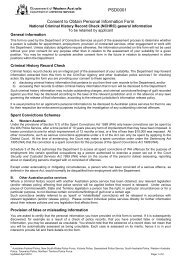
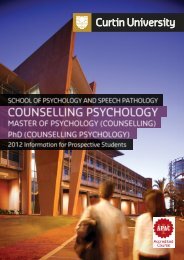
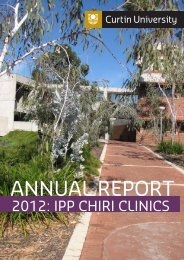
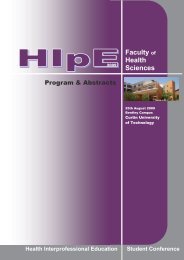
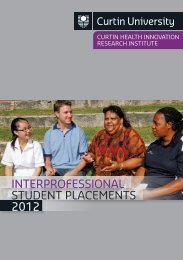
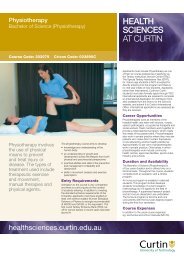
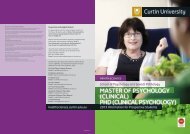
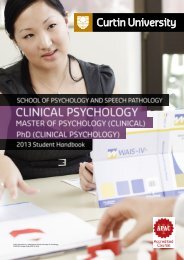

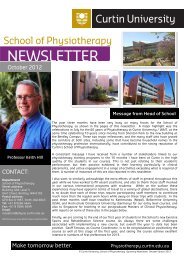
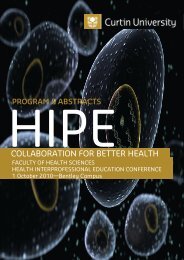

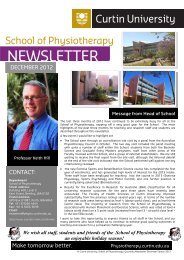
![2007 Annual Report [.pdf] - Health Sciences - Curtin University](https://img.yumpu.com/44476724/1/184x260/2007-annual-report-pdf-health-sciences-curtin-university.jpg?quality=85)